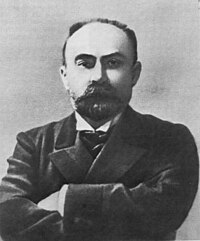Georgi Plekhanov
| Born | December 11/November 29, 1856 Gudalovka, Governorate of Lipetsk |
|---|---|
| Died | May 30/May 17, 1918 |
Georgi Valentinovich Plekhanov (Георгий Валентинович Плеханов) (December 11, 1856 – May 30, 1918; Old Style: November 29 1856 – May 17 1918) was a Russian revolutionary and a Marxist theoretician. He was a founder of the Social-Democratic movement in Russia and was the first Russian Marxist.
Plekhanov contributed many ideas to Marxism in the area of philosophy and the roles of art and religion in society. After a fiery speech outside Kazan Cathedral in 1876, indicting the autocracy and defending the ideas of Chernyshevsky, Plekhanov led an underground life. In his political activities he adopted the nom de guerre of Volgin, after the Volga River. Some have commented that this name influenced the famous revolutionary Vladimir Ilyich Ulyanov adopting the name Lenin to highlight his opposition to Plekhanov's politics. This claim is however refuted due to the timing involved. The first instance of Lenin's pseudonym predates any disagreement with Plekhanov. Plekhanov also used the pseudonym of N.Beltov in his most famous work, The Development of the Monist View of History.
Plekhanov was originally a Narodnik, a leader of the organization "Land and Liberty". After emigrating from Russia in 1880, he established connections with the Social-Democratic movement of western Europe and began to study the works of Marx and Engels. This led him to renounce Narodism and become a Marxist.
In 1883 in Switzerland, he co-founded with Lev Deutsch and Vera Zasulich, the "Emancipation of Labor" group, which popularized Marxism among Russian revolutionaries. At its dissolution, he joined the Russian Social Democratic Labour Party (RSDLP) and worked with Lenin.
In 1903, at the second congress of the RSDLP, Plekhanov broke with Lenin and sided with the Mensheviks. During World War I, he took a "nationalist" position (as opposed to the Bolsheviks' "proletarian internationalism"), calling for the defeat of Germany. Lenin accused Plekhanov, along with his other critics, of "social chauvinism" in the April Theses. Plekhanov was quoted as claiming that Lenin was advocating "civil war" in the socialist movement by supporting the creation of a new International after the 1915 Zimmerwald Conference and the subsequent dissolving, in 1916, of the Second International.
Despite his differences, Plekhanov was recognized, even in his own lifetime, as having made an outstanding contribution to Marxist philosophy and literature by Lenin. "The services he rendered in the past," Lenin wrote of Plekhanov, "were immense. During the twenty years between 1883 and 1903 he wrote a large number of splendid essays, especially those against the opportunists, Machists, and Narodniks." Even after the October Revolution Lenin insisted on republishing Plekhanov's philosophical works and including these works as compulsory texts for prospective communists.
Plekhanov returned to Russia after the February Revolution and formed Yedinstvo. However, he left Russia again after the October Revolution because he was hostile toward the Bolsheviks. He died of tuberculosis in Terijoki, Finland (now Zelenogorsk, Saint Petersburg, Russia). He was buried in the Volkovo Cemetery near the graves of Belinsky and Dobrolyubov. Despite his disagreements with Lenin, the Soviet Communists cherished his memory and gave his name to the Soviet Academy of Economics and the G.V. Plekhanov St. Petersburg State Mining Institute.
Works
- A New Champion of Autocracy 1889
- Anarchism & Socialism (1895)
- The Development of the Monist View of History (1895)
- Essays on the History of Materialism (1896)
- The Materialist Conception of History (1891)
- Belinski and Rational Reality (1897)
- The Role of the Individual in History
- Fundamental Problems of Marxism (1908)

